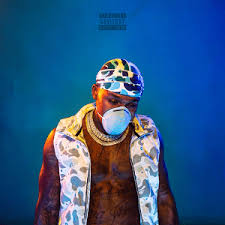

On April 17, DaBaby released his album “Blame it on Baby,” a haphazard configuration of witlessly raunchy lyrics and regurgitated flow leaving much to be desired. DaBaby, born Jonathan Kirk, grew his presence in the rap industry with hits like Suge and collaborations with big artists like Megan Thee Stallion and Camila Cabello. “Blame it on Baby” marks DaBaby’s third studio album in the past 13 months, and his efforts to pump out a plethora of manufactured pseudo bops came directly at the expense of the quality and versatility of the album itself. Somehow, “Blame it on Baby” peaked at No. 1 in the Billboard 200 Albums Chart, a clear indication that the album does appeal to a wide audience. However, those who value lyrical depth and unique flow can skip this album.
The crass lyrics in every song included in the album, but most specifically the song “Nasty,” featuring Ashanti and Megan Thee Stallion, will make grandma’s soul leave her body. The issue of the lyrical composition has less to do with vulgarity and more so with the utter lack of taste and finesse that accompanies it. He must have taken inspiration from a teenage boy aggressively grunting out his sexual fantasies. It does not take a religious person to deem the track “Amazing Grace” borderline blasphemous, disgracing the original ballad. “First time I ever robbed a plug, *, I was still in school (like seventeen)”–how sweet is the sound? Not very. Emotional lyrics in “Can’t Stop” will bring tears to listeners’ eyes: “B*tch, you know I turn piss into lemonade/Turn sh*t into sugar, that’s chocolate pudding.” One can not help but wonder why the lyric was included in the first place. It adds no value and makes little to no sense, but that seems to be a running theme with the album at large. Despite these vast shortcomings, props can be given for his inclusion of featured artists like Ashanti, which add another dynamic layer to the album, the source of its first half star.
DaBaby has long been criticized for being a one trick pony, and the unoriginal and generic beats of this album did little to prove critics wrong. Listeners will experience the same fast paced, high energy aggression for almost the entire 33 minutes of the album, which may be pleasing to select people. “Sad Sh*t” aims to employ a more emotional tone but misses the mark by a long shot. He attempts to switch up the flow in the title track “Blame it on Baby”: “They be like, ‘Why you switched the beat?’ Because my flow neat.” Unfortunately, this effort falls flat and comes across as disjointed. Because all the songs sound similar, none of them leave a memorable impression.
On a positive note, the album cover is bright and eye catching which makes it deserving of another half a star. The inclusion of the face mask on the cover is a blatant marketing strategy to circulate more conversation around the album, but it works. It also calls attention to the fact that DaBaby made an entire album in the midst of a pandemic which is a feat in and of itself, earning the album its last half star.
By releasing one album after the other, DaBaby is presumably trying to avoid fading out of the public view, but this strategy is not working in his favor. Hopefully going forward, he will take more time to develop and hone in on his work before rapidly releasing it to the public. Until then, his albums will spiral on a downward trajectory.
Rating: 1.5/5 stars





